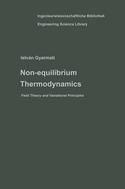Non-equilibrium Thermodynamics, Softcover reprint of the original 1st ed. 1970 Field Theory and Variational Principles Ingenieurwissenschaftliche Bibliothek Engineering Science Library Series
Langue : Anglais
Auteur : Gyarmati Istvan

Although nearly three years have elapsed since the publication of this work in Hungarian, it was decided to publish the English edition in the same form as the original, apart from some minor modifications. Since, recent research has been directed to the development of an exact theory of non-linear irreversible processes; we suggest to readers interested in similar tasks - such as the continuation of this boo- that they should study some new publications: "On the most general form of the Thermodynamic Integral Principle", Z. phys. Chem. 239 (1968) 133, and particularly: "On the Governing Principle of Dissi pative Processes", Ann. Phys. 7 (1969) 23. I have to thank my wife and Mr. W.F.HEINZ for the translation of the very concise Hungarian text. I also wish to express my gratitude to Dr. L.KARADI and Mr. Gy. VINCZE for reading the typescript with such care and to Mrs. A. R6sZLER, who typed the manuscript with great patience. I am deeply indebted to Professor ISTVAN SZABO for making this edition available so quickly and for including my work in the "En gineering Science Library". Finally, I would like to express my thanks to Springer-Verlag for the excellent edition and to the editorial staff for their readiness to meet my wishes.
First Part Field Theory and Thermodynamics.- I. Fundamental Concepts of the Field Theories.- 1. The Aim of Classical Field Theory. Deformation.- 2. Continuity.- 3. Motion.- 4. Material and Spatial Description.- 5. Mass and the Material Equation of Continuity.- 6. Multi-component (superposed) Continua.- II. Balance Equations.- 1. General Balance Equations.- a) Local Balances.- b) Substantial Balances.- 2. Balances of Mass.- 3. Balances of Charge.- 4. The Equation of Motion.- 5. Balances of Impulse.- 6. The Mechanical Equilibrium.- 7. Balances of Angular Momentum.- 8. Balances of Kinetic Energy.- 9. Balances of Potential Energy.- 10. Balances of Mechanical Energy.- III. Thermodynamics of Continua.- 1. The Local Forms of the First and Second Law.- a) The First Law.- b) The Second Law.- c) The Condition of the Cellular (local) Equilibrium.- 2. Conservation of Energy and the Balances of Internal Energy.- 3. Entropy Balances and Entropy Production.- 4. The Linear Kinematical Constitutive Equations.- a) Anisotropic Case.- b) Curie Principle.- c) Isotropic Case.- 5. Reciprocal Relations.- a) Anisotropic Case.- b) Isotropic Case.- Second Part Variational Principles.- On the Variational Principles in General.- IV. The Principle of Least Dissipation of Energy.- 1. Non-equilibrium Potential Functions.- 2. The Local Forms of the Principle.- a) The Flux Representation.- b) The Force Representation.- c) Universal Local Form of the Principle.- 3. The Gaussian Form of the Local Principle.- 4. Applications of the Local Principle for Constraint Problems.- 5. The Global Forms of the Principle.- a) The Special Forms of the Principle for Adiabatically Isolated Systems.- b) The Special Forms of the Principle for Stationary Systems.- V. The Principle of Minimum Production of Entropy.- 1. Stationary States of Discontinuous Systems.- 2. Formulation of the Principle for Continua.- 3. The Relation between Onsager’s and Prigogine’s Principles.- 4. Applications.- a) Heat Conduction in Solid Bodies.- b) Stationary States of Thermodiffusional Systems with Chemical Reactions.- 5. Generalizations.- VI. The Integral Principle of Thermodynamics.- 1. Deduction of the Fourier Equation.- a) The Fourier Picture.- b) The Energy Picture.- c) The Entropy Picture.- d) The Generalized “?” Picture.- 2. Formulation of the Integral Principle.- 3. Deduction of the Fick Equations of Isothermal Diffusion.- 4. Deduction of the General Equation of Motion of Hydrodynamics..- 5. Non-isothermal Transport Equations.- 6. Deduction of the Transport Equations in a General Form.- 7. Relations between Integral Principle and Hamilton Principle.- 8. Thermodynamics in Canonical Form.- a) The Canonical Field Equations.- b) Legendre Transformations.- c) The Canonical Form of the Dissipative Integral.- 9. Conclusions.- Append.- On the Elements of Vector and Tensor Calculus.- 1. Fundamental Concepts and Simple Operations.- 2. Symmetric and Antisymmetric Tensors.- 3. Tensor Products.- 4. Tensor Derivatives.- References.
Date de parution : 04-2014
Ouvrage de 184 p.
15.5x23.5 cm
Disponible chez l'éditeur (délai d'approvisionnement : 15 jours).
Prix indicatif 52,74 €
Ajouter au panierMots-clés :
Thermodynamik irreversibler Prozesse; development; dynamics; thermodynamics; translation
© 2024 LAVOISIER S.A.S.



